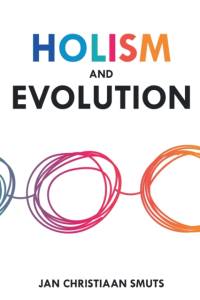Über Holism and Evolution
In 1926, J. C. Smuts coined the term holism, which he defined as "the tendency in nature to form wholes that are greater than the sum of the parts through creative evolution."
This theory made Smuts a preeminent philosopher, and has been applied to ecology, language and mental states. After studying Smuts's "Holism and Evolution", Albert Einstein posited that in the coming millennium, two mental constructs would direct the human mind, his mental construct of relativity, and Smuts's theory of holism.
Smuts's book is broken into enlightening chapters. In the first three, he discusses the reformed concepts of time, space and matter. In 4, he delves into cell and holism, a chapter which serves as a precursor to holism in biology. In 5, 6 and 7, he discusses the general concepts, categories and mechanism in holism. In the last 5 chapters, he discusses Darwinism and Holism, the mind as an organ of wholes, personality as a whole (its functions and ideals) and the holistic view of the universe.
Smuts's theory of holism affects every facet of our life, and it's a must read for anyone who seeks to comprehend the holistic approach to life and its place in the universe.
Mehr anzeigen

